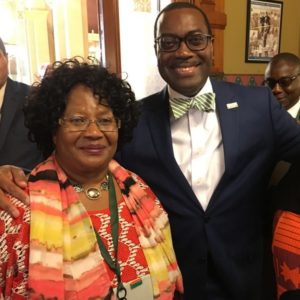The World Food Prize is awarded to four researchers at the 2016 Borluag Dialogue
From 12-14 October 2016, the Borluag Dialogue was held in Iowa, United States, and included the award ceremony of the 2016 World Food Prize laureates; Drs. Maria Andrade, Howarth Bouis, Jan Low and Robert Mwanga. Three of the 2016 laureates – Drs. Maria Andrade, Jan Low and Robert Mwanga of the International Potato Center (CIP), which has had sweet potatoes in its research mandate since 1988 – are being honored for their work developing the single most successful example of biofortification, the orange-fleshed sweet potato.
 From 12-14 October 2016, the Borluag Dialogue was held in Iowa, United States, and included the award ceremony of the 2016 World Food Prize laureates; Drs. Maria Andrade (Cape Verde), Howarth Bouis (United States), Jan Low (United States) and Robert Mwanga (Uganda). Three of the 2016 laureates – Drs. Maria Andrade, Jan Low and Robert Mwanga of the International Potato Center (CIP), which has had sweet potatoes in its research mandate since 1988 – are being honored for their work developing the single most successful example of biofortification, the orange-fleshed sweet potato.
From 12-14 October 2016, the Borluag Dialogue was held in Iowa, United States, and included the award ceremony of the 2016 World Food Prize laureates; Drs. Maria Andrade (Cape Verde), Howarth Bouis (United States), Jan Low (United States) and Robert Mwanga (Uganda). Three of the 2016 laureates – Drs. Maria Andrade, Jan Low and Robert Mwanga of the International Potato Center (CIP), which has had sweet potatoes in its research mandate since 1988 – are being honored for their work developing the single most successful example of biofortification, the orange-fleshed sweet potato.
Dr. Andrade and Dr. Mwanga, plant scientists in Mozambique and Uganda, bred the Vitamin A-enriched OFSP using genetic material from CIP and other sources, while Dr. Low structured the nutrition studies and programs that convinced almost two million households in 10 separate African countries to plant, purchase and consume this nutritionally fortified food. The fourth winner, Dr Howard Bouis who founded HarvestPlus at the International Food Policy Research Institute, has been honoured for his work over 25 years to ensure biofortification was developed into an international plant breeding strategy across more than 40 countries.

Akinwumi A. Adesina, President of African Development Bank Group and member of the SUN Movement Lead Group with Joyce Banda, Former President of the Republic of Malawi, Founder of the Joyce Banda Foundation and former member of the SUN Movement Lead Group,
Vitamin A deficiency is considered to be one of the most harmful forms of malnutrition in the developing world. It can cause blindness, limits growth, weakens immunity and increases mortality. The condition affects more than 140 million pre-school children in 118 nations, and more than seven million pregnant women. It is said to be the leading cause of child blindness in developing countries. The efforts of the 2016 World Food Prize Laureates have positively impacted over 10 million people through biofortified crops, with the potential of impacting and enhancing the nutrition and health of several hundred million more in the coming decades.
Each year, the laureate(s) award ceremony is held during a three-day Borluag Dialogue (Des Moines Symposium) in October in Des Moines, Iowa: home of the World Food Prize Foundation. The title of the 2016 Borlaug Dialogue was “Let Food Be Thy Medicine,” a quote attributed to Hippocrates approximately 2,400 years ago which best captures the ground-breaking achievement for which the 2016 World Food Prize laureates are being honored. The 2016 symposium also shined the spotlight on the World Food Prize’s 22nd Anniversary Global Youth Institute.
Speakers during the Borluag Dialogue included Akinwumi A. Adesina, President of African Development Bank Group and member of the SUN Movement Lead Group, Joyce Banda, Former President of the Republic of Malawi, Founder of the Joyce Banda Foundation and former member of the SUN Movement Lead Group, Jim Yong Kim, President World Bank Group and Ameenah Gurib-Fakim, President of Mauritius.
I wish to specially recognize the presence of President Banda at this important gathering. When she served as Head of State, she demonstrated genuine desire to improve the quality of life of Malawians and ensure national prosperity through workable policies, especially in agriculture. She is an embodiment of progress and prosperity; a development agent.”
Akinwumi Adesina, President of African Development Bank Groupand member of the SUN Movement Lead Group.
View the agenda and list of side events
Visit the World Food Prize website
Learn more with articles by BBC and Nyasa Times
Background to the World Food Prize
Dr. Norman E. Borlaug, recipient of the 1970 Nobel Peace Prize, founded the World Food Prize in 1986. Borlaug saw the Prize as a means of establishing role models who would inspire others, and since then has been awarded to outstanding individuals who have made breakthrough achievements contributing to improving the quality, quantity or availability of food throughout the world.